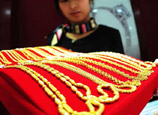
No UNESCO status
The temple officially asked for the World Heritage Status application to be dropped last week, although Kuanshu acknowledged the move was unlikely to make a difference.
Liu fed those fears by saying that government organs will have the final say in going ahead with the application or not.
At the same time, the Silk Road application as a whole involves three countries and the UNESCO deadline is drawing near, making it difficult to say exactly how much sway the monks' opposition will have.
Local officials labelled the monks as selfish during an interview with the Xinhua News Agency on Friday, adding that the application was in their interests and that of the nation.
"It is a pity that the temple doesn't support the application but this is not the problem. This reflects that both understanding of the World Heritage Status and the application process and are still lacking," Liu said.
The purpose of getting UNESCO World Heritage Status is to better protect heritage. As such, it is routine for many buildings around cultural sites to be demolished during the application process before supervision is brought in, should a bid be successful.
Experts openly admit that many authorities are gunning for their area to win the status as it brings in numerous tourists and considerable revenues. This has meant that applications for UNESCO World Heritage sites have been filed thick and fast in China in recent years.
"We would support the UNESCO application if it brought real protection to the temple. But we question whether some people just want to take advantage of this to make money," Kou said.
The local authority has strenuously denied that it is planning to turn the temple into a tourist site by taking advantage of its religious value. It has also stated that no private company is involved in the plans.
However, these claims have largely fallen on deaf ears, as a document from the Chang'an government that was leaked in March 2012 showed that the district government planned to invest some 230 million yuan ($37 million) to turn the temple and the surrounding village into a tourist attraction spot.
Yue said the public had lost faith in the government on this issue. Should the authorities seek to rebuild this trust, making real efforts to protect the relics instead of seeking to make a quick buck would be a good first step.
Liu echoed Yue's opinion, adding that the Xingjiao Temple case could be a warning or precedent in the future when other local governments seek to apply to UNESCO while riding roughshod over the wishes of the public.



















![]()
